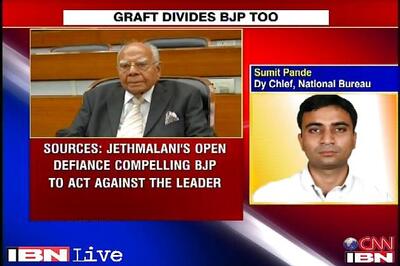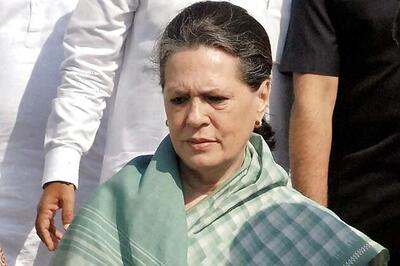
views
The Supreme Court on April 5, 2023, refused to entertain a petition filed by 14 political parties alleging that the central investigating agencies such as the Directorate of Enforcement (ED) and the Central Bureau of Investigation (CBI) are being weaponised by the Modi government to clamp down on dissent, by arresting Opposition leaders. This verdict is a stinging slap on a combined Opposition that had the gall to doubt the bonafide of our premier probe agencies and then had the audacity to file such a petition in the apex court. Surely, the Congress and these Opposition parties were caught on the wrong foot when the Supreme Court said that political leaders cannot claim a higher immunity than ordinary citizens and hence, a special set of guidelines cannot be issued for them. Imagine the entitlement of the Opposition that it even dared to demand that politicians are a privileged class and need to be treated with kid gloves. The Bharatiya Janata Party (BJP), on the other hand, has always stood for inclusivity and has never played the politics of entitlement, bordering on unfounded narcissism.
Abhishek Manu Singhvi, the lawyer for the Opposition, eventually had to eat humble pie. He took the court through certain statistics to argue that Centrally controlled investigating agencies are being increasingly deployed in a ‘selective and targeted’ manner against political opponents. He argued that between 2004-2014, of the 72 political leaders investigated by the CBI, 43 were from the Opposition, now the same figure has risen to over 95 percent. The same pattern, he alleged, is reflected in ED’s investigations as well, with the proportion of Opposition leaders from the total number of politicians investigated rising from 54 percent (before 2014) to 95 percent (after 2014). After outlining the said figures, Singhvi argued that there is a skewed application of CBI and ED jurisdictions and the skewed application of law has a chilling effect on our democracy. Well, Singhvi clearly suffers from selective amnesia because if democracy has indeed ever been threatened in India, it was only when the Congress regime was in power, including the dark era of Emergency under the draconian Indira Gandhi, from 1975 to 1977.
“Are you saying that because of these statistics, there should be immunity from investigation?” Chief Justice Chandrachud asked Singhvi. Political leaders can’t claim higher immunity, the CJI added, saying, “The problem with this petition is that you are trying to extrapolate statistics into guidelines, where the statistics only apply to politicians. But, we cannot have guidelines exclusively for politicians.” Singhvi, in a futile bid to score some brownie points for his petitioners, added, “Mass arrests are a threat to democracy. It is a sign of authoritarianism. The process becomes the punishment.” To this absurd and devious charge by Singhvi, the CJI went on to say, “Political leaders stand absolutely on the same standing as the citizens of the country. They do not claim a higher identity. How can there be a different set of procedures for them?”
Chief Justice Chandrachud, while asking the Opposition/petitioners to come back with specific instances, said that the top court could not lay down abstract guidelines, adding, “It would be dangerous to formulate general guidelines in the absence of such specific facts.” However, the biggest rebuttal and a clear snub to the 14 Opposition parties came when the CJI told Singhvi, “When you say that space for Opposition has shrunk, the remedy is in that space, the political space. Not the court.” With those words, the CJI called out the bluff of India’s electorally vanquished Opposition which was desperately trying to find a judicial remedy to a political matter, after repeatedly losing elections at the hustings. This petition by Singhvi, on behalf of the Opposition, was basically put in a trash can by the apex court, sending out a loud and clear message that any attempts to delegitimise the ED and CBI or the Modi government’s war against corruption, will not find any takers in the highest echelons of the judiciary unless backed by hard facts.
Speaking of PM Modi’s unrelenting anti-corruption crusade, besides the April 5, 2023, verdict which came as a shot in the arm for the Modi government, even back in 2022, on July 27 last year, the apex court upheld the constitutional validity of the Prevention of Money Laundering Act, (PMLA), 2002, thereby dismantling the puerile hopes of a debilitated Opposition which wanted PMLA provisions to be diluted. The July 2022 verdict relied on a judgement given earlier, under Vijay Madanlal Choudhary versus the Union of India. The judgement was pronounced by a bench of Justices — AM Khanwilkar, Dinesh Maheshwari and CT Ravikumar — on a batch of 241 petitions challenging the validity of the law. The court upheld the validity of Sections 3 (definition of money laundering), 5 (attachment of property), 8(4) (taking possession of attached property), 17 (search and seizure), 18 (search of persons), 19 (powers of arrest), 24 (reverse burden of proof), 44 (offences triable by special court), and 45 (offences being cognizable and non-bailable). The court also held that the supply of Enforcement Case Information Report (ECIR) under PMLA proceedings by the ED is not mandatory, since ECIR is an internal document and cannot be equated to a First Information Report (FIR). Supply of ECIR to the accused is not mandatory and only disclosure of reasons of arrest to the accused during arrest are enough. Even the ED manual is not to be published since it is an internal document, the court held. It also rejected the argument about the proportionality of punishment under PMLA Act, with respect to scheduled offences as wholly “unfounded.” The court added that the stringent conditions for bail under the PMLA Act are legal and not arbitrary. Enforcement Directorate, Serious Fraud Investigation Office (SFIO), Directorate of Revenue Intelligence (DRI) officials, and not ‘police’ statements recorded during an inquiry are valid evidence, the court added, in a stinging rebuttal to Modi baiters and the Opposition which has been making frivolous allegations about the supposed high handedness of the ED.
However, the court held that the question of enactment of amendments in 2019 to the PMLA Act as Money Bill has to be decided by a larger bench of seven judges before whom, the same question is already pending. The apex court’s verdict upholding arrests by the ED under PMLA is a big blow to the Left and Congress ecosystem, which has been crying hoarse needlessly about how arrests by ED are such cases tantamount to gross violation of stated procedures.
Coming back to PMLA, what exactly were the concerns of the petitioners which were in any case found to be devoid of any merit by the apex court in its July 2022 judgement? Well, the petitioners had questioned various aspects of the law including the wide powers given to ED for search, seizure and attachment, the reverse burden cast on the accused to prove innocence, the admissibility of statements made to ED as evidence, the stringent conditions for grant of bail and the impact of predicate offence and its outcome, in PMLA cases. The Modi government had argued that the offence of money laundering under Section 3 is a standalone offence so long as there is a predicate offence irrespective of whether there is acquittal or conviction in such predicate offences. Pertinently, it was also argued by the Central government that money laundering under Section 3 is a continuing offence, irrespective of the time at which the predicate offence is included in the Schedule. The apex court last year stated that money laundering is a standalone offence under the PMLA, in a big victory for the Modi government, which has zero tolerance for corruption and has been fast-tracking such cases, much to the discomfiture of the Opposition.
Speaking of money laundering, it is important to talk of the Patra Chawl scam, reportedly abetted by Uddhav Thackeray’s close aide Sanjay Raut. Raut, the leader of the erstwhile Maha Vikas Aghadi (MVA) coalition in Maharashtra is notorious for being a rabble-rousing motor mouth. As per the ED, Guru Ashish Construction Private Ltd signed an agreement with the Maharashtra Housing and Area Development Authority (MHADA) in 2007 to provide new homes to 672 tenants of Patra Chawl in Mumbai’s suburban area of Goregaon, then develop flats for MHADA and sell the remaining area to private developers. However, the ED claims that Pravin Raut and other directors of Guru Ashish Constructions did not build a single house for the 672 displaced tenants. They actually sold the floor space index to nine private developers for Rs 901.79 crore. In addition, Guru Ashish Constructions launched a project called “The Meadows” and received bookings worth approximately Rs 138 crore from flat buyers. According to the ED, Guru Ashish Constructions’ total proceeds of crime from these “illegal activities” amount to Rs 1,039.79 crore. According to the ED, their investigations revealed that Pravin received Rs 100 crore from HDIL and diverted it to various accounts of his close associates, family members, and business entities, including Sanjay Raut’s family. The ED also stated that in 2010, Varsha Raut received Rs 83 lakh in criminal proceeds directly or indirectly from Madhuri Raut, Pravin Raut’s wife. Varsha Raut used this money to purchase a Dadar apartment. It was also revealed that after the ED investigation was launched, she transferred Rs 55 lakh to Madhuri Raut. There are also a number of other transactions, the ED said. Clearly, the investigation into the Patra Chawl scam by the ED shows the deep-rooted nexus between Sanjay Raut, his spouse and of course, his close associates in not only fleecing the poor of hundreds of crores, but also trying to brazenly hoodwink the regulators. However, with the ED getting a huge pat on the back from the top court, corrupt politicians like Raut will now have to learn to be accountable.
This landmark judgement by the Supreme Court, upholding powers of the ED under PMLA, comes at a time when the Congress party has also been desperately trying to shield the Gandhi dynasty from persistent ED summons to Sonia Gandhi and Rahul Gandhi who are out on bail in the National Herald money laundering scam. Sonia and Rahul’s lackey, P Chidambaram, is also out on bail in the INX Media scam. What an irony that while the entire top brass of the Congress is out on bail in either money laundering or tax evasion charges, including the much-maligned head of Karnataka Congress, DK Shivakumar, Rahul Gandhi and his minions preach about ethics and integrity to all and sundry. Besides the Congress, Mamata Banerjee’s Trinamool Congress (TMC) has been floundering with key TMC heavyweights like Partha Chatterjee, accused in the SSC scam, Anubrata Mondal, accused in the Cattle scam, Moloy Ghatak, accused in the Coal scam and many others from the TMC, who are either behind bars or in judicial custody. While Mamata can scream from the rooftops about vendetta politics by the BJP, the harsh truth is, the TMC is a web of notoriety and corruption given that the likes of Partha and Moloy have been close aides of Mamata and ministers in the West Bengal regime. These TMC heavyweights have been indicted by the courts and not the BJP. While a trial is still underway, in most cases it is clear that TMC leaders find themselves sentenced by the judiciary due to ample evidence and not due to any alleged shenanigans by the BJP. Ditto goes for Arvind Kejriwal’s Aam Aadmi Party (AAP), which has seen two of Kejriwal’s closest aides, Satyendar Jain and Manish Sisodia, behind bars for money laundering and involvement in the Delhi liquor scam respectively, putting to shame the very principles of political propriety and morality that AAP was supposedly founded on. Manish Sisodia and Satyendar Jain epitomise all that is horribly wrong with Kejriwal’s corrupt AAP. In fact, the court said that Sisodia was the mastermind and key architect of the liquor scam. No discussion on a corrupt Opposition is complete however, without a discussion on how K Kavitha, the daughter of the Telangana CM, KCR, who is also being probed for her links in the liquor scam, continues to play the victim card. What the Opposition fails to realise is that the courts have repeatedly upheld the proof submitted by the ED and the CBI and hence, each time the Opposition blames the Modi government, it is actually undermining the very core of our impartial judicial process.
Backing the ED with a crucial judgement, the top court in 2022 upheld almost all the stringent provisions of the Prevention of Money Laundering Act (PMLA) in proceeds of crime, search and seizure, power of arrest, attachment of properties, and bail, which were under challenge in the court. Section 19, which deals with the power to arrest, does not suffer from the “vice of arbitrariness”, the court said, adding that Section 5 of the Act relating to the attachment of property of those involved in money laundering, is also constitutionally valid. Money laundering not only affects the social and economic fabric of the nation but also tends to promote other heinous offences such as terrorism, offences related to NDPS Act (Narcotic Drugs and Psychotropic Substances Act) etc, the court said. The petitioners had argued that unchecked power to arrest the accused without informing them of grounds of arrest or evidence is unconstitutional. They further said the ED recording incriminating statements from an accused during questioning under the threat of being fined for withholding information amounts to compulsion. The supply of ECIR copy to the accused is not mandatory as it is an internal document, the top court said. The petitioners said that putting the burden of proof on the accused violates fundamental rights like the right to equality and the right to life.
Another major challenge, that filing PMLA charges on cases that occurred before 2002 (when PMLA came into existence) is unconstitutional, was also turned down last year by the apex court. The Modi government justified it by saying that money laundering is a continuing offence, and not a single act but a chain. Proceeds of crime could have been generated before 2002 but could have still been in possession or in use by the accused post-2002. ED’s money laundering raids are up 26 times under the Modi government. Proceeds of crime worth Rs 99,356 crore were attached between 2014 to 2022 while only Rs 5346 crore was attached between 2004 to 2014, under an inept Congress regime. While there were 888 prosecution complaints under the Modi government, there were just 104 between 2004 to 2014, showcasing how increased searches endorse PM Narendra Modi’s commitment to preventing money laundering.
The top court last year justified the Constitutional validity of the provisions of the PMLA, thereby nailing the Opposition’s bluster. The Modi government has repeatedly defended the amendments to PMLA, saying money laundering poses a threat not only to financial systems but also to the integrity and sovereignty of nations, since it is conducted not just by corrupt businessmen, but also by terror groups. It would suffice to say that honesty is still the best policy under Prime Minister Narendra Modi’s government. Also, amidst allegations that its probes are launched for political reasons, the ED has claimed a conviction rate of 96 percent in cases registered under the PMLA, in which trials have already been completed. According to the latest data released by the ED, of the 25 cases (as of January 2023) with completed trials, 24 resulted in conviction leading to sentencing of 45 accused. Trials are in progress in other 1142 cases, with the ED having filed chargesheets. A 96 percent conviction rate in PMLA cases is in fact, an excellent rate of conviction, in contrast to the 56 percent notched in cases prosecuted under the IPC.
During the last 8.5 years, the ED has also attached assets worth a solid Rs 1.15 lakh crore in about 2000 attachment orders.
It recovered more than Rs 20,000 crore by selling confiscated assets and returning the money owed to the banks by errant borrowers. Major recoveries have been made from the sale of assets belonging to fugitive economic offenders like Vijay Mallya, Nirav Modi and Mehul Choksi. What a travesty of fate that while the Congress shouts and hollers against Nirav Modi in India, in London, it was Abhay Thipsay, a Congress leader, who fought tooth and nail to prove Nirav Modi’s innocence. That Thipsay lost the Nirav Modi case is another matter altogether. The moot point is simply this – India’s electorally vanquished Opposition has failed to take on PM Modi electorally, given his unstoppable popularity. The ED and the CBI are only doing their job impartially, without any political bias whatsoever. Hence it is time for Rahul Gandhi and his ilk to wake up and smell the coffee!
Sanju Verma is an Economist, National Spokesperson of the BJP and the Bestselling Author of ‘The Modi Gambit’. Views expressed are personal.
Read all the Latest Opinions here




















Comments
0 comment